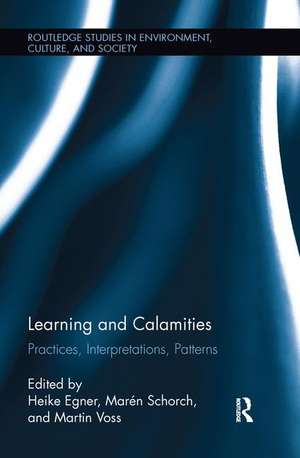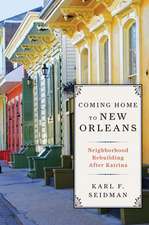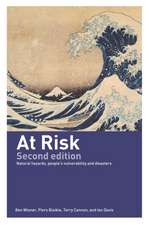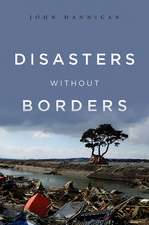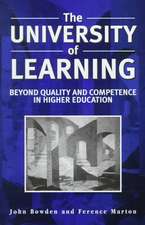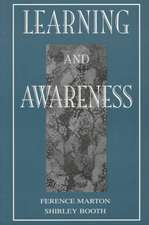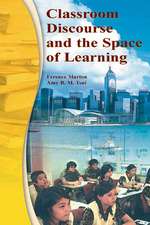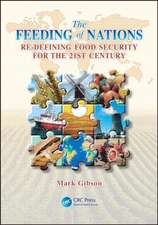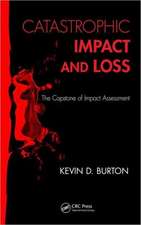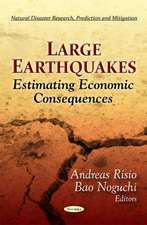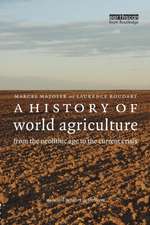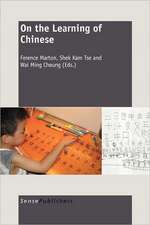Learning and Calamities: Practices, Interpretations, Patterns: Routledge Studies in Environment, Culture, and Society
Editat de Heike Egner, Marén Schorch, Martin Vossen Limba Engleză Paperback – 14 dec 2016
| Toate formatele și edițiile | Preț | Express |
|---|---|---|
| Paperback (1) | 469.34 lei 6-8 săpt. | |
| Taylor & Francis – 14 dec 2016 | 469.34 lei 6-8 săpt. | |
| Hardback (1) | 1059.45 lei 6-8 săpt. | |
| Taylor & Francis – 9 sep 2014 | 1059.45 lei 6-8 săpt. |
Preț: 469.34 lei
Nou
Puncte Express: 704
Preț estimativ în valută:
89.81€ • 92.79$ • 74.71£
89.81€ • 92.79$ • 74.71£
Carte tipărită la comandă
Livrare economică 19 martie-02 aprilie
Preluare comenzi: 021 569.72.76
Specificații
ISBN-13: 9780415334907
ISBN-10: 041533490X
Pagini: 334
Ilustrații: 34
Dimensiuni: 152 x 229 x 18 mm
Greutate: 0.45 kg
Ediția:1
Editura: Taylor & Francis
Colecția Routledge
Seria Routledge Studies in Environment, Culture, and Society
Locul publicării:Oxford, United Kingdom
ISBN-10: 041533490X
Pagini: 334
Ilustrații: 34
Dimensiuni: 152 x 229 x 18 mm
Greutate: 0.45 kg
Ediția:1
Editura: Taylor & Francis
Colecția Routledge
Seria Routledge Studies in Environment, Culture, and Society
Locul publicării:Oxford, United Kingdom
Public țintă
Postgraduate and UndergraduateCuprins
Foreword Kathleen Tierney. Acknowledgments. 1. Introduction: Can Societies Learn from Calamities? Heike Egner, Marén Schorch, and Martin Voss Part I: Opening the Fields of Learning and Calamities 2. Learning from Disasters in an Unsafe World: Considerations from a Psychoanalytical Ethnological Perspective Bernd Rieken 3. Learning About Disasters from Animals Greg Bankoff 4. Beyond Experiential Learning in Disaster and Development Communication Andrew E. Collins Part II: Learning from History? 5. "The Monster Swallows You": Disaster Memory and Risk Culture in Western Europe, 1500-2000 Christian Pfister 6. A Disaster in Slow Motion: The Smoke Menace in Urban-Industrial Britain Stephen Mosley 7. Historia Magistra Vitae, as the Saying Goes: Why Societies Do Not Necessarily Learn from Past Disasters Uwe Lübken Part III: Educational Concepts for Disaster Preparedness 8. Using a Spare-Time University for Disaster Risk Reduction Education Ilan Kelman, Marla Petal, and Michael H. Glantz 9. Communicating Actionable Risk: The Challenge of Communicating Risk to Motivate Preparedness in the Absence of Calamity Michele M. Wood 10. Critical Reflection on Disaster Prevention Education Marla Petal Part IV: Organizational Patterns of Interpretation and Practices of Learning 11. Normalization and its Discontents: Organizational Learning from Disaster Sven Kette and Hendrik Vollmer 12. Analyses of Natural Disasters and Their Contribution to Changes in Natural Hazard Management in Switzerland Michael Bründl 13. How Not to Learn: Resilience in the Study of Disaster Benigno A. Aguirre and Eric Best Part V: Societal Patterns of Interpretation and Practices of Learning 14. When Push Comes to Shove: The Framing of Need in Disaster Relief Efforts Tricia Wachtendorf, Samantha Penta, and Mary M. Nelan 15. Reduced Learning Processes Due to Biopolitical Patterns of Interpretation: Michel Foucault and the Contamination Disaster Matthias Hofmann 16. Science versus Metaphysics. The Importance of Everyday Life Experience for the Interpretation of Disaster Elísio Macamo and Dieter Neubert Part VI: Closing 17. Learning and Calamities—What Have We Learned?: Steps Towards an Integrative Framework Heike Egner and Marén Schorch
Notă biografică
Heike Egner is Professor of Geography and Regional Studies at the Alpen-Adria-Universität Klagenfurt (Austria).
Marén Schorch is a Research Assistant at the University of Siegen (Germany).
Martin Voss is head of the Disaster Research Unit at Freie Universität Berlin (Germany).
Marén Schorch is a Research Assistant at the University of Siegen (Germany).
Martin Voss is head of the Disaster Research Unit at Freie Universität Berlin (Germany).
Descriere
Despite the widespread opinion that calamities foster learning processes, there is much evidence that failure remains the norm. This book explores whether learning in the context of calamities occurs at all, and if so, under which conditions learned knowledge and practices can be achieved and preserved on a societal level in the long run.
